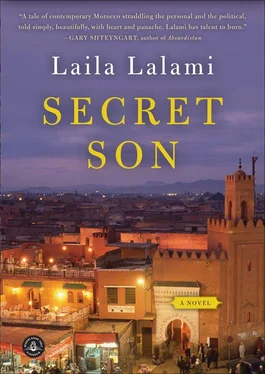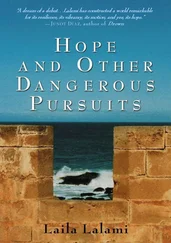“Praise be to God,” his mother said, rising from her seat and breaking into a series of high-pitched joy cries. She hugged him tightly, her head barely reaching his chest. She told him that she had asked God for good results every day for the past year, and that He had answered her prayers. “Now, everything is going to change.”
Youssef had never seen his mother so happy. She looked years younger now, her eyes sparkling with joy. He smiled as he kissed her hand.
“I’m going to make something special for dinner tonight,” she said. “What would you like?”
His thoughts drifted to his father, as they always did on special occasions. “If only he could have seen me,” he said.
Her face returned to its usual cautious seriousness.
“What’s wrong?” he asked.
She looked away. She picked up a shirt from the laundry pile and began to fold it.
“What is it that you’re hiding from me?”
“Nothing.”
Youssef took the shirt from her hand. “Tell me,” he said.
There was no grand soliloquy — the sort of thing he had seen hundreds of times in the movies. His mother spoke very tersely about her life. The Franciscan nuns at the Bab Ziyyat orphanage had sent her to train as a nurse in a hospital. She had been there a few months when a young lawyer by the name of Nabil Amrani came in for a minor checkup. He had been involved in a scuffle with the police at a political rally. They started to see each other, and she quickly became pregnant. They planned to get married. The weekend before their wedding, Nabil went to Casablanca to pick up his brother from the airport, but in the morning fog his car collided with a truck and he died. Madame Amrani, Nabil’s mother, had never approved of the marriage, and when she was told about the pregnancy, she accused Youssef’s mother of sleeping with one of the doctors at work. Youssef’s mother could not complete her training and went to live with a friend from the orphanage until after the birth. Then she left Fès and settled down in Casablanca.
“Amrani? Like the bus company?”
She shrugged. “It’s a common name.”
“What about my last name, El Mekki?”
She looked down. “I bribed an official to put that name on your birth certificate.”
Youssef swallowed. Was that all there was to his story? It was a tale of outrageous misfortune, and yet it was utterly ordinary: he had been born an illegitimate child. That was why his mother had never stayed in touch with his father’s family and why his father’s family never came looking for him. He wanted to take her by the shoulders and shake her. Why had she kept the truth from him? Who was Nabil Amrani? Was there no hope that the Amranis would want to meet him? His head was filled with questions, but he was too angry to formulate them.
He walked out of the house, delivering himself to the scorching afternoon heat. As he made his way to the Oasis café, he realized with a mix of horror and delight that he had not been the only actor in the house. All his life, his mother had played the part of the respectable, grieving widow, talking frequently about the happiness that had been cut short by a terrible accident. She had told him that his father was a good teacher, that he loved to read books, that he always helped her with chores around the house. Those were all lies. And now she had burdened Youssef with her secret, so that he, too, had to play a role.
THAT SUMMER IN CASABLANCA was humid. The oppressive heat strangled hibiscus shrubs, leaving shriveled red and pink flowers on brittle branches. People drew their curtains to keep their homes dark and cool, but children still played football outside. The older of them took the bus to the beach, returning home with their noses red and their shoulders blistered. At the market, vendors hawked their homemade ice cream or fresh-squeezed orange juice (“ ‘Asir, ‘asir! Dirham, dirham wahed!”), their voices getting hoarse by the end of the afternoon. At night, turbaned old men ventured out to crowded cafés, where they drank glass after glass of mint tea and played endless rounds of Ronda.
Youssef spent all that time avoiding his mother. In the morning, he did not get out of bed until after she had already left for work; during the day, he went to the beach with Maati and Amin; at night, he played chess or watched TV at the Oasis. He could not bring himself to talk to her. Mothers were mothers; they were not supposed to have sexual lives. How could he talk to her about how he had been conceived? He also blamed mektub. Had his father not died in that car accident, the wedding would have taken place on schedule and no one would have known that his mother was already pregnant. Now he knew, and that brought him shame he could barely conceal and certainly never share. By avoiding his mother, he could perhaps forget the existence of her secret.
But it was difficult once September came and school started. He watched from his bed as his mother opened the armoire to pull out a button-down shirt for him to wear with his blue jeans. “Here,” she said cheerfully. “I ironed it for you.”
“Thank you,” he said, looking away, unable to summon the same excitement. When he still believed he was the son of a respectable schoolteacher, he had modest but clear ambitions — to become a teacher himself or perhaps a civil servant. But now that he knew he was the illegitimate son of a community organizer, he felt somehow diminished, as though he were already marked for an unfavorable future.
They sat down to eat breakfast together. News on the radio was the usual: the king had met some foreign dignitaries; there was bloodshed in Palestine and Israel, in Iraq and the Congo; a French delegation had toured Moroccan companies and praised them, saying they were on “the right track”; a festival of music was set to open in Agadir; the Widad was on a losing streak. The bulletins compounded the sense of futility that had been growing inside him.
“It’s going to be a beautiful day.”
He did not answer.
“Are you ready for registration?”
He nodded.
“Do you have a copy of your baccalauréat? ”
He patted the bag next to him.
“And the photographs for your ID card?”
“Yes.”
“May God open all doors for you,” she said.
She looked as if she were about to give him a hug; he dodged it by grabbing his bag and slinging the strap across his shoulders. He stuffed the hundred-dirham bill she gave him for his registration fee in his jeans pocket and left.

Just three weeks into the school year, Youssef could already see clusters of students huddling together in distinct cliques. There was the Mercedes-and-Marlboro group, half a dozen spoiled kids who, for one reason or another, had not gone to college abroad like the rest of their friends. They spoke French, wore designer clothes and carried patent leather satchels, spent their time smoking expensive cigarettes and talking about holidays in Paris or weekends in the bars of Marrakech.
There was the headscarf-and-beard faction — girls who looked at once virtuous and threatening, and boys who had the same determined expressions as the Partisans. They organized strictly along gender lines, with the girls sitting on the stairs outside the building, chatting about which hadith recommended which manner of eating or drinking or sneezing, while the boys carried on their own quiet conversation, occasionally passing out leaflets that urged students to join their group, the Islamic Union of Students.
The Marx-and-Lenin group met at the other end of the main hall, right under the windows. There were only five or six of them, and they spent most of their time complaining about the condition of the classrooms, the cafeteria, and the library, or reading the newspaper while sharing a cigarette. They had formed the Democratic Union of Students, though they had not yet printed any leaflets; they were still arguing over which background color to use.
Читать дальше













